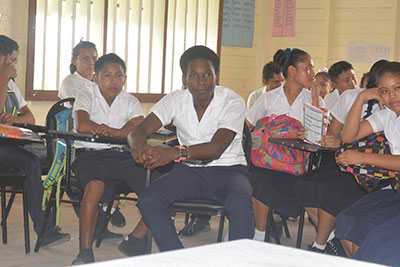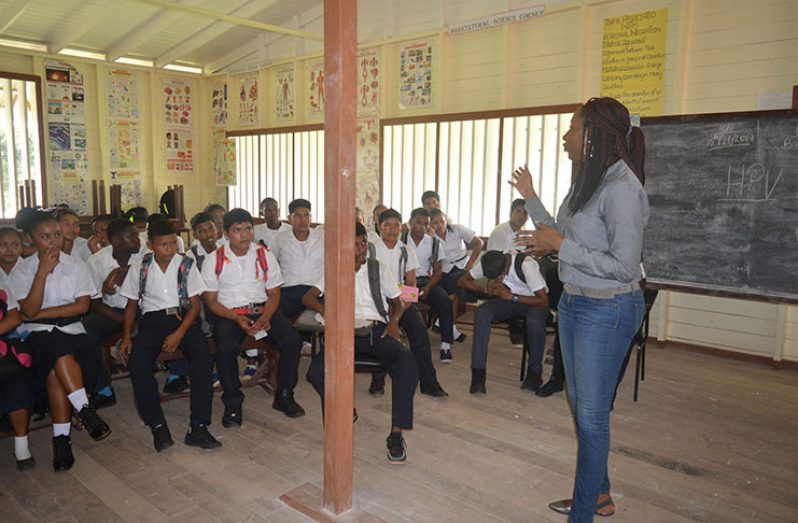AS part of the government’s Human Papilloma Virus (HPV) immunisation campaign, the Ministry of Public Health, Adolescent Health Coordinator, Dr. Oneka Scott, visited the Mahdia Secondary School in Region Eight (Potaro-Siparuni) to speak with students on the issue.

Students of Grades Nine, 10 and 11 from the Mahdia Secondary were on Friday informed about Sexually Transmitted Infections and Diseases (STI/STD) and how they could protect themselves against these illnesses.
HPV is presently the world’s most common STD, so much so that half of persons who become sexually active, will, by the age of 50, have some form of infection from HPV. There are over 100 types of HPV recorded with vaginal, anal, penile and cervical cancers being a few of the harsh consequences of the infection.
Dr. Scott disclosed that many persons in Guyana are not well-informed of STIs, and as such she was impressed when one of the notably attentive students correctly indicated Chlamydia and Trichomoniasis as being two of the most prevalent STIs in the world.
The opinion of Dr. Scott is that many Guyanese do not hold in high esteem the intelligence levels of persons living in the hinterland region. She debunked this notion, stating that those sentiments sometimes are not always the case, “…that our hinterland people don’t know anything… our children are prepared, they were diverse.”
The children were surprised, however, to know that condom is not 100 percent effective against the HPV and other forms of STIs. Scott was then pressed to explain why the vaccine was only being administered to a specific portion of the population.
“The age group we are assuming are not yet sexually active is nine to 13. The vaccine works better if it’s given to individuals before they become exposed to the HPV virus…sadly in Guyana, most of our teens are having sex at 10, 11 and,12 years, so they are already exposed to some sort of the HPV, so we are targeting the girls that are younger because we hope that they’re not yet exposed sexually,” Scott made it clear.
In addition to this, it is the costly nature of the vaccine which prohibits the Health Ministry from administering the injection to males and females, as is being done in countries in Europe and in the United States.
At the session, students were asked to encourage adult females in their household to get a Visual Inspection with Acetic Acid (VIA) or Pap smear which tests for cervical cancer cells. Scott advised that early treatment is best and would help in ensuring that women in Guyana no longer perish from cervical cancer. The Ministry of Public Health launched its campaign against HPV in October of this year and intends to target over 36,000 girls.




.jpg)










